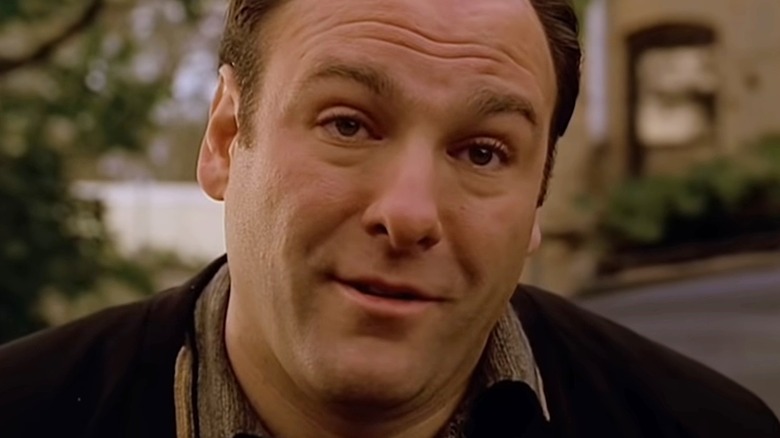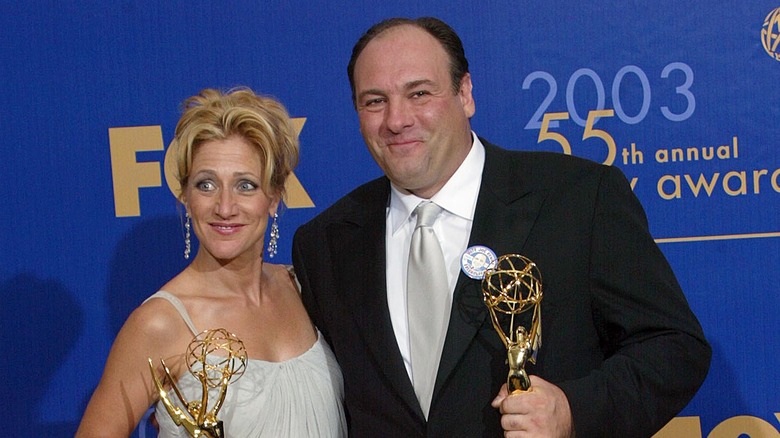It's Not TV Co-Author Felix Gillette On Why The Sopranos Provided A Huge Turning Point In HBO's History - Exclusive
HBO's mob drama "The Sopranos" is a landmark series for many reasons, chief among them its dominance over its television competitors during its six-season run from 1999 to 2007. Proof of that is most evident with the way the series steamrolled its way through the Primetime Emmy Awards, earning 111 nominations during its illustrious run that yielded 21 wins — including two statuettes for Outstanding Drama Series — and three top acting Emmys each for stars James Gandolfini and Edie Falco for playing show leads Tony and Carmela Soprano.
As much love as fans and awards voters showed for "The Sopranos" over its six seasons, there are actually other reasons why the series marked a major turning point in the history of HBO. The blistering success of "The Sopranos," created by David Chase, is one of the many subjects covered in authors Felix Gillette and John Koblin's new book "It's Not TV: The Spectacular Rise, Revolution, and Future of HBO" (Viking), which chronicles the highs and lows of the cable-turned-streaming giant's eventful 50-year history.
"The Sopranos" wasn't an easy sell for Chase, writes Gillette, of Bloomberg News, and Koblin, of The New York Times, in "It's Not TV" — mainly because Chase found little interest from the major broadcast networks about a series where a mob boss explains his problems away to a therapist. It was a decision that obviously came back to bite them, as "The Sopranos" wasn't just another hit series for HBO; it was the series that catapulted the cable network to the next level.
The Sopranos drove broadcast executives 'crazy with jealousy,' Gillette says
In an exclusive interview with Looper, Gillette said "The Sopranos" proved to be such a "huge turning point" for HBO because it "was so massively popular." He elaborated, "It was event television. It was something that dominated the water cooler talk. It was the first show on HBO that drove the broadcast networks executives crazy with jealousy, that they were like, 'We want that, and we can't do it. We can't have that level of violence. We can't have that level of intensity. The characters are so rich and different.' They saw it happening and they realized, 'Wow, the tide is really changing.'"
Gillette and Koblin note in "It's Not TV" that Fox Television had an interest in "The Sopranos," but eventually backed out. "In the book, we get into how almost lucky it was that it ended up on HBO because originally, David Chase sold the idea to Fox," Gillette said. "He wrote a couple scripts. [Then] they decided, 'Nah, it's not [for us].'"
When Fox pulled the plug on "The Sopranos," Chase was naturally dejected, Gillette and Koblin wrote. But when HBO acquired the series, it eliminated the broadcast TV content restrictions Chase would have been beholden to, and as such, the trajectory of "The Sopranos" was forever changed.
"Early in the development, when Fox was basically getting cold feet, they said, 'Hey, you know what? We can offer Jim Belushi as the lead. They would've [cast him as] Tony Soprano ... It's very funny to think of a world in which 'The Sopranos' was on Fox with Jim Belushi," Gillette said. "That didn't happen, and James Gandolfini got the role, and we recall that story also in the book. David Chase, of all the people I talked to for the book, of the hundreds of interviews we did, he is an amazing person to talk to. It was so much fun to hear his memories of the show and how it got started."
"It's Not TV: The Spectacular Rise, Revolution, and Future of HBO" is new in stores and online.

